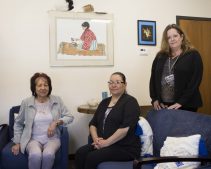
Each year, Citizen Potawatomi Nation’s Workforce and Social Services assists thousands of unemployed, underemployed and economically disadvantaged Native Americans across central Oklahoma. The department provides assistance locally and through outreach services in Cushing, Stillwater, Norman and Chandler.
“We give them a hand-up, not a handout,” said Workforce and Social Services Director Carol Clay-Levi.
CPN hired Clay-Levi 34 years ago. She worked in the commodity food program before transferring to Workforce and Social Services. Today, her department administers 12 programs, 10 of which serve members of federally recognized tribes other than CPN through Public Law 102-477.
This law allows the Nation to collaborate with other tribes combining Indian employment, training and social services funding and programing under one roof.
Overcoming roadblocks
After completing an application, Clay-Levi’s team ensures the individual meets the qualifications for aid and then conducts an analysis to find potential barriers. Once those are defined, the client receives an assigned counselor for guidance overcoming their challenges and developing attainable goals.
Lynn Heath, CPN data and staff coordinator, said the department’s approach attempts to set clients on the road to success.
“They’ve already been through failure in their life,” Heath said. “That’s why they’re here.”
Heath, a member of the Seminole Nation of Oklahoma, dropped out of school at age 14. Through Public Law 102-477, CPN staff were able to help her obtain her GED and gain employment on the Tribe’s farm 17 years ago.
After her stint harvesting okra, Heath served as a receptionist and held numerous positions within Workforce and Social Services before moving into her current title as CPN data and staff coordinator.
Service through experience
While she does not perform case management in her new role, she still takes the time to listen and provide support where she can.
“When you come to me, you’re going to get exactly what you really need to be told,” she said.
Heath also relies on her first-hand experience and her Native perspective while assisting clients.
“I’ve seen so many come in, and they’re like, ‘I’m a single mom. I cannot do it. I have no education. I can’t handle it,’” she said. “I’ve been there; I understand. … I know how hard it is. I know how much it’s going to take.”
Client dedication
Workforce and Social Services supports each individual through finding opportunities and breaking negative cycles.
“A lot of times, when they come in, you’re the only person that they have because they are at rock bottom — they’ve exhausted all of their family resources,” said Marla Grider, adult employment counselor.
Grider assists with job placement and honing interview skills as well as resume and cover letter writing.
“Our clients aren’t just case numbers. We truly take time to know the situation and spend a lot of time with them one-on-one,” Grider said.
Counselors are able to assist clients with required clothing for employment and transportation by utilizing other CPN programs and connecting clients with non-profits and other organizations for outside resources when needed. Grider and other staff also travel to satellite offices to serve Native Americans in need who are in our jurisdiction but unable to make the trip to the main office at CPN headquarters.
Grider, Heath and Clay-Levi see success stories daily. From lifting young, single mothers out of poverty to subsidizing school supplies for grandparents raising grandchildren and helping re-entry clients choose a better path, each success, no matter the size, energizes them.
In fact, Heath stressed the department stays open through lunch and employees visit clients outside of business hours.
“There’s almost always a way that we can help,” Grider said.
The programs are more than assisting with finances or jobs.
“They’ve helped me grow as a person, and I hope that we do that for other people,” Heath said. “I’ve been here for a long time, so I’m kind of like mold. I just keep growing.”
